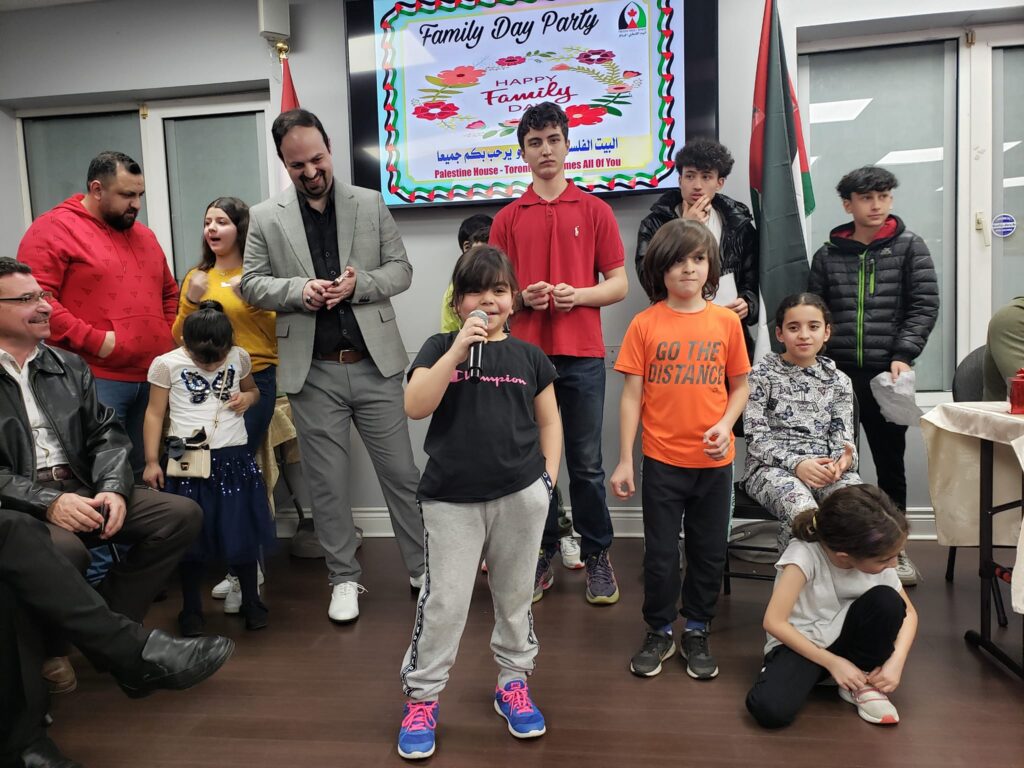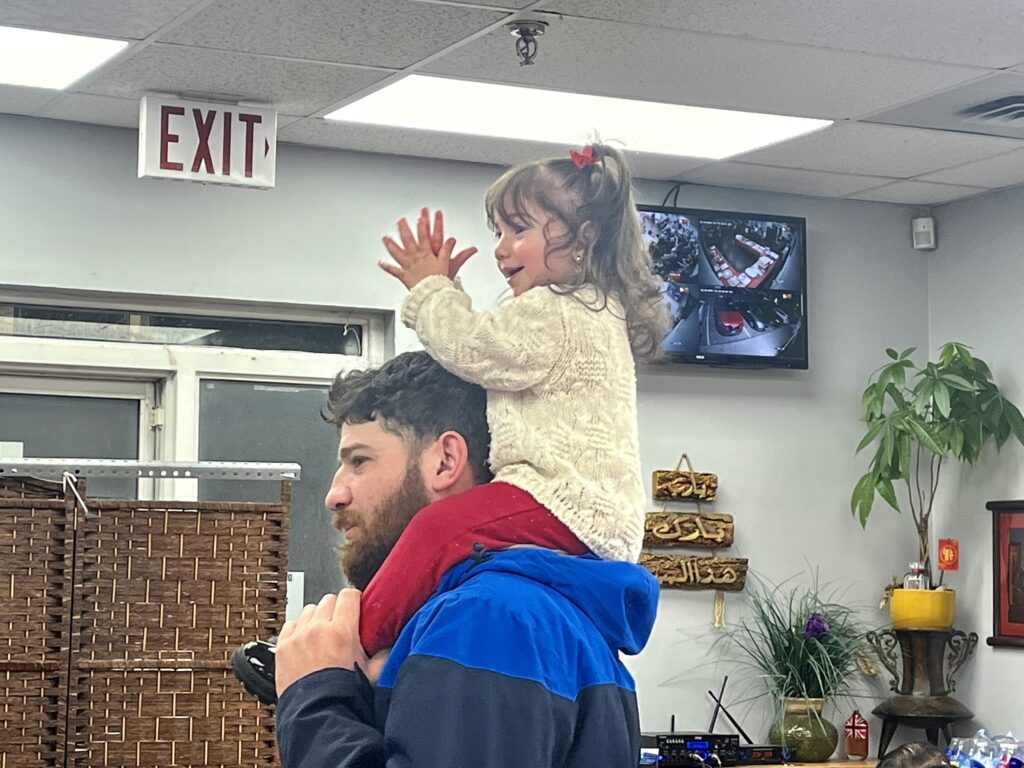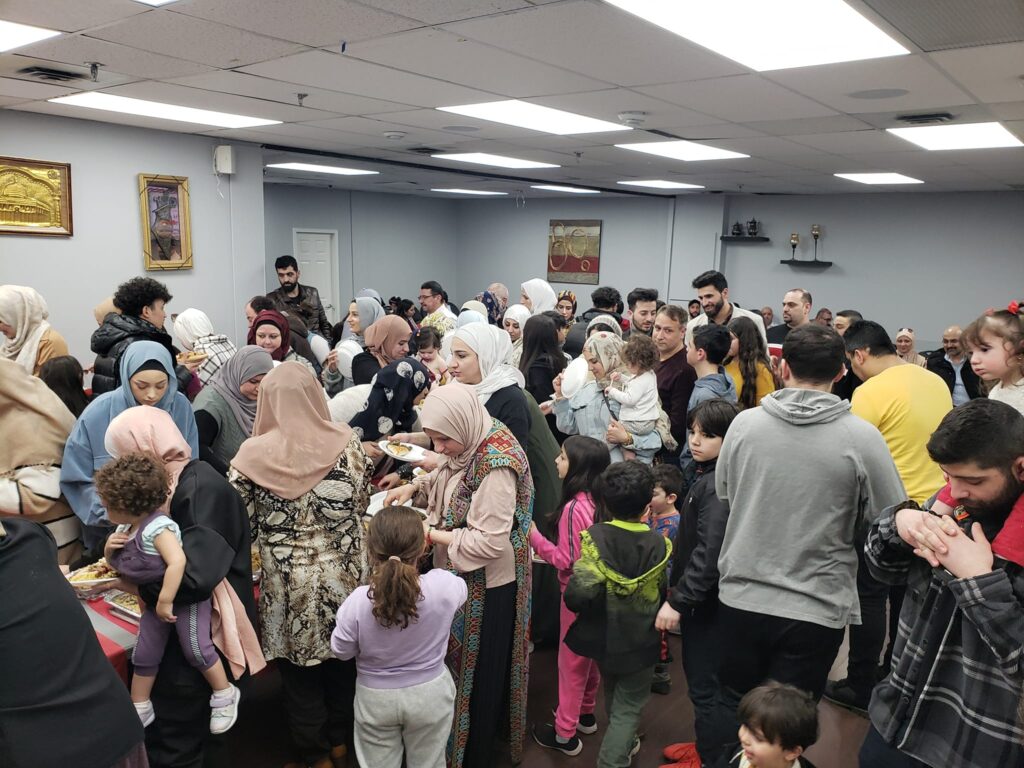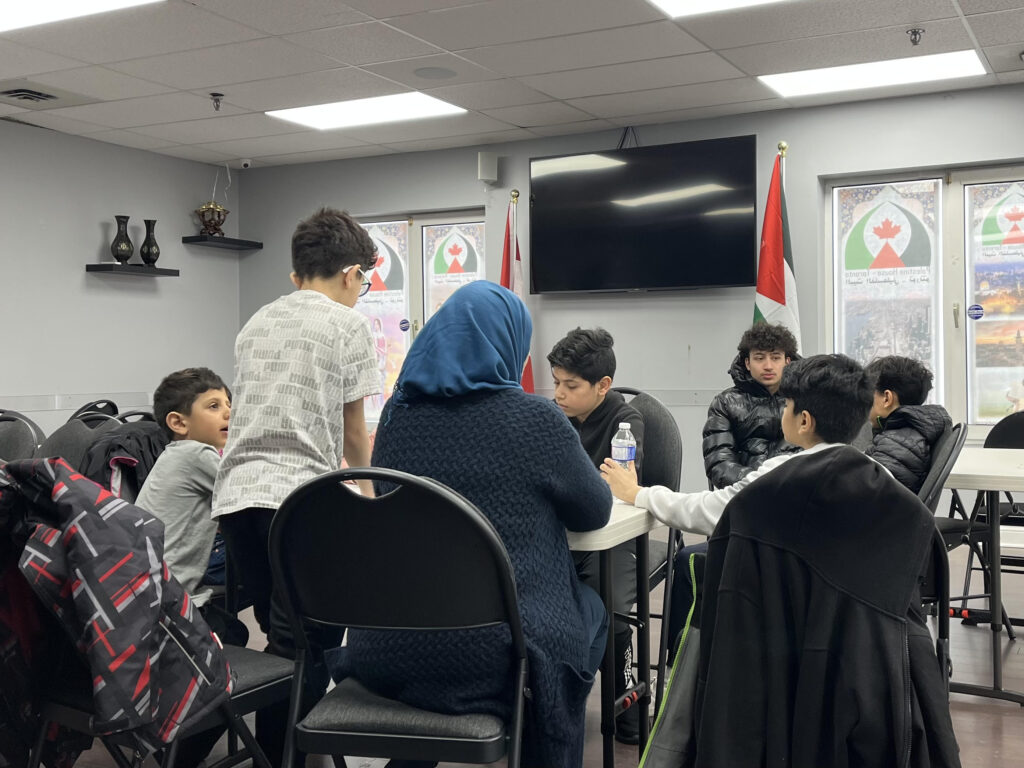By Hania Noor
A swarm of people gallop towards the entrance, their balance thrown off by the weight of the large trays in their hands. “As-Salaam-Alaikum,” they are greeted after being pulled in for a hug and kiss on each cheek.
It’s loud inside. Nearly a hundred people spread around the room. Children sprint across the compact space while others sit in chairs or casually stroll around, catching up on life, mainly in Arabic, rarely in English. They are dressed in their best, whether in embroidered abayas with matching hijabs or their favourite dark-washed denim.
It’s Family Day, and everyone is gathered at Palestine House Toronto, a local community centre in Clarkson, Mississauga. The non-profit and independent centre, open since 2019, has over 300 members of Palestinian identity. According to their value code, the centre is a place to engage with Palestinian culture through activities like Saturday afternoon Dabke class or Sunday morning Arabic lessons.
At 2:30 p.m. on one particular Saturday, the stern cadence of Maher Ayash, the Dabke instructor, echoes throughout the place. It’s a chilly weekend in the middle of February, but Mohammed Gadamani, 16, managed to get out of bed and show up to class. He’s accompanied by Yasser El Maoued, 13, and his older brother, Mohammed El Maoued, 17.
Dancing Dabke, a Levantine folk dance notorious in Palestine, is nothing new to the Palestinian boys. Today, however, some of their friends from school have curiously followed in their footsteps.
It’s their parents who have brought them here. For Gadamani, whose family immigrated to Canada from Jordan nearly four years ago, finding the centre has been a source of comfort.
“New country, new language, and the first year here, I was telling my parents I want to go back to Jordan,” he said.
Walking into Palestine House Toronto with his father in 2021, he assumed the space was for “old people.” But, after scanning the room and seeing other teens, he gave it another chance. Now, he’s a regular member, part of the Dabke team and an occasional ping-pong enthusiast.
The Canadian-born brothers, Yasser and Mohammad, have had a different journey. Born into a proud Palestinian family, learning about the culture has been a significant part of their lives. However, as younger children, choosing Arabic and Dabke classes over going out with friends was not their idea of fun.
Although they’ve always “repped” Palestine, they say having the community around has helped them appreciate it more. Dancing Dabke and introducing it to their friends, whether they are Canadian, Pakistani or Iraqi, makes them feel Palestinian. It allows them to understand why their parents pushed them through those doors.
“If my dad didn’t do that, I think I would’ve lost it by now,” Mohammad El Maoued says.
Settling in Canada, in a vastly different culture, presents these sorts of challenges for Palestinians. First-generation immigrants have to adapt to a foreign culture while trying to find pieces of home in it. In many cases, these first-generation immigrants have had to settle in places outside the Palestinian region before coming to Canada. As they move from place to place, from culture to culture, the chances of their Palestinian identity fading away presents another challenge. On the other hand, second-generation Palestinians like Yasser and Mohammad have to do the work to maintain their cultural identity by taking the initiative to learn. This tension in cultural identity between first-generation parents and their second-generation children often brings forth gaps in language, culture (food, music, etc.), and beliefs. With such hurdles, how do Palestinian families maintain a connection to their culture while simultaneously trying to assimilate into a foreign land?
Mohammad twirls his necklace in his fingers as he speaks. It’s a present from his sister: a silver chain outlining the geographic region of Palestine. When I ask to take a closer look, he happily shows it to me, explaining the Arabic writing on it.
Three years ago, Palestine House Toronto re-opened under its current name. A different version of the centre had existed before but was closed down due to controversy. Its board members embedded a new value system that would place all their efforts on cultural programming and communal gatherings.
In 2017, allegations of Amin El Maoued, the director of Palestine House Toronto, making anti-semitic remarks surfaced. He denies these claims and says he has worked to establish a community that thrives on respect for everyone, regardless of nationality or religion. Since then, the director says he has built ties with both Jewish and Christian communities in efforts of reconciliation and mutual support.
Although being Palestinian often brings up political discourse, the centre says it is not a place of political discussion but rather the cultural understanding of Palestine.
“They can do that research at home, but when they come here, just have fun, learn about their culture, and have a good time. This place is not only for Palestinians, anyone can come,” says Mohammad El Maoued.
Another critical aspect of preserving Palestinian culture is the Arabic language. Dr. Rania Ibrahim, the coordinator of Arabic language for the department of languages, literatures and cultures at Toronto Metropolitan University, says Arabic is heavily nuanced with many geographically and culturally defined variants – so much so that two Arabic speakers may have trouble understanding each other due to dialectical differences. For this reason, she urges that teaching formal Arabic at a young age is necessary for binding communities together.
Arabic flows through the centre almost always, but especially on Sundays. Children are gathered around Rasmieh Mustapha, the Arabic teacher, as she speaks. There are pens and papers scattered around the room, with scribbles of Arabic littering every corner. Everyone speaks in Arabic, and when English comes out, Mustapha gently urges them to repeat the sentence in their native language.
Nine-year-old Touba Mustapha tells me she enjoys learning Arabic. She likes showing her mother what she’s learned and getting proud pats on the head. Touba has improved, only occasionally needing help with translation.
The cheers are deafening when she presents in front of everyone on Family Day. Her bright smile is captured perfectly in her mother’s camera, who herself has tears in her eyes. Every child who presents gets cheers, hoots, and hugs from the audience, no matter how well their Arabic performance went.
Mohamed Fayyad, advisor at Palestine House Toronto, says this communal aspect has helped him make a home out of Canada.
Immigrating from China a year ago with his family, Mohamed felt in Canada, he could practice his culture and religion openly. Although he taught his son, Hassan, about Palestine at home, he feels now his son can see for himself what a Palestinian community looks like. Meeting friends and engaging in Palestinian activities has made the culture and idea transfer from father to son smoother.
It’s nearly 10:30 p.m. when the chaos of Family Day dies down. Everyone works together to put the chairs and tables away neatly. The pile of empty metal trays grows in one corner, a sign of a good meal. Although the night has come to an end, nobody would be able to tell by the chatter that vibrates through the room. People bid farewell only to get wrapped up in another conversation. Nobody leaves or enters unnoticed. Nobody sits and eats alone. Their passion for the culture of Palestine brings them together, and they celebrate one another for keeping the traditions going.
During our last conversation, Mohamed Fayyad tells me, “Palestine is the only nation where the country is inside its peoples’ hearts.” From Dabke performances, Arabic speeches, silver geographic necklaces, and green, red and white all over the place, it’s clear these families want to keep Palestine alive in their hearts – for current and future generations.





